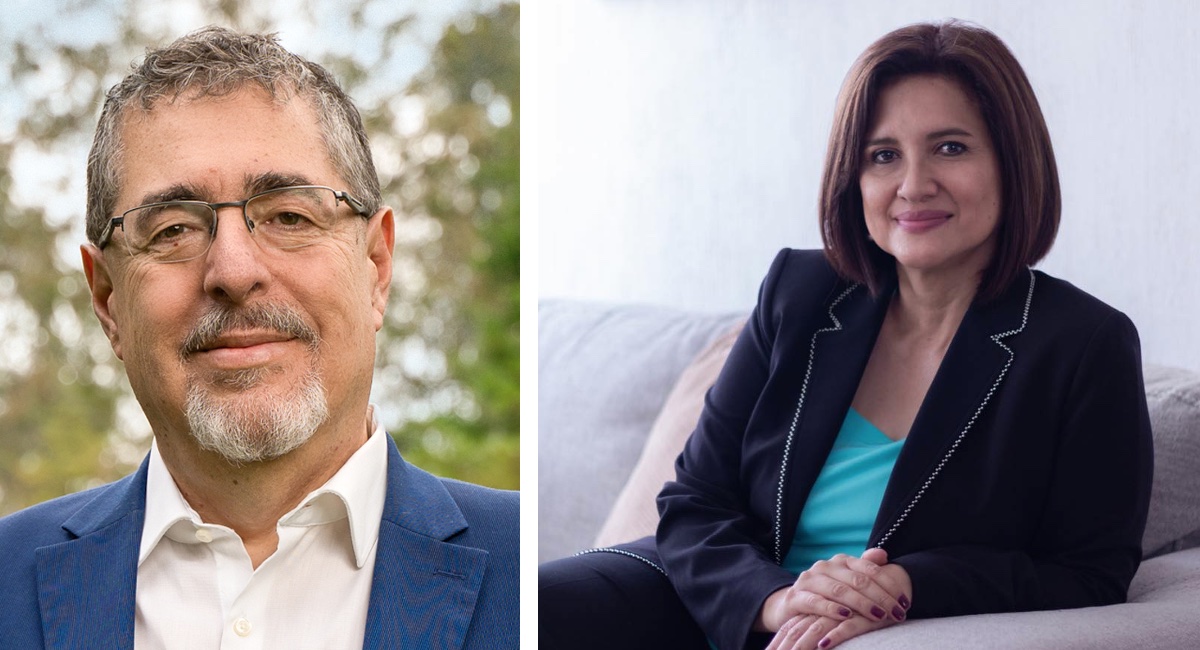Image: Bernardo Arévalo (L) won the 2nd and final round of voting in Guatemala and will take over as the Central American nation’s next president alongside his running mate, Karin Herrera.
Progressive candidate Bernardo Arévalo of the Semilla Party has emerged the winner in the second and final round of voting for president in Guatemala, according to results from the Central American nation’s electoral commission.
Arévalo beat his rival, Sandra Torres of the National Unity of Hope party. A one-time first lady and wife to former president Álvaro Colom, this was Torres’ third run for the office.
Arévalo, a sociologist by training, and his running mate, Karin Herrera, a scientist with the University of San Carlos, won more votes than current president, Alejandro Giammattei won during his election in 2019.
“Today we accept with great humility this victory that Guatemalans have delivered,” said Arévalo in a speech after the results were announced, adding the results demonstrated the desire of Guatemalans to end the corruption that has long plagued Central America’s most populated country. “What the people call for is, enough with corruption!”
Fighting against corruption was one of Arévalo’s key themes throughout his campaign.
Arévalo also had a few words for Torres. “We have different approaches when it comes to politics, but we guarantee her and her constituents that their rights as citizens will be promoted and protected without distinction.”
In remarks after the election, vice-president elect Herrera promised she and Arévalo would create a government that is for all Guatemalans and that cares for all people, “regardless of differences.”
In a sign of that commitment, both Arévalo and Herrera wore a pin with the Guatemalan flag instead of the usual party pin, as a sign that they will work for the citizens.
Arévalo also noted that celebrations in the streets were spontaneous and not organized by his party. Thousands poured onto the streets shortly after the results were announced, crowding into Guatemala City’s Plaza de la Constitución, a scene of protests in 2015, and in the Obelisco, a few short kilometers from the hotel where the party held its press conference.
Others gathered in front of the hotel where Semilla officials celebrated, greeting them with chants of, “Yes we could.”
Arévalo said plans are being made for a celebration with the population, however, he did not specify the place or the date. As for his cabinet, he mentioned that it is still under discussion and will be presented next week.
He noted that he had received congratulatory calls from Mexican President Andrés Manuel López Obrador, as well as El Salavdor’s president, Nayib Bukele and current Guatemalan President Alejandro Giammattei, who has promised an orderly transfer of power.
Semilla’s initial success in the first round of voting came as a surprise to the establishment. And despite efforts to blunt its momentum, including the criminalization and prosecution of the party by Guatemala’s Public Ministry, its popularity continued to grow.
Still, despite the win expectations are that criminal investigations into Semilla and its members will continue, with allegations of fraud leveled against the party and talk of warrants being issued in coming days or weeks.
Arévalo said in response to the allegations that his team remains calm and confident, adding that his path to victory was clean and transparent and that the allegations being levelled against Semilla are baseless. He called the current investigation illegal.
Allegations of voter coercion and vote buying, meanwhile, were circulating on election day. Semilla filed complaints with the electoral commission accusing Torres’ party of attempting to lure votes with promises of cash and other incentives.
Torres cancelled a planned press conference after the results were announced. In the 2019 election, the candidate obtained 1,384,044 votes, while in the 2023 elections she obtained 1,499,589 votes.
This story was written by Regina Pérez and was originally published in Spanish by the Guatemala-based news site, Prensa Comunitaria.




